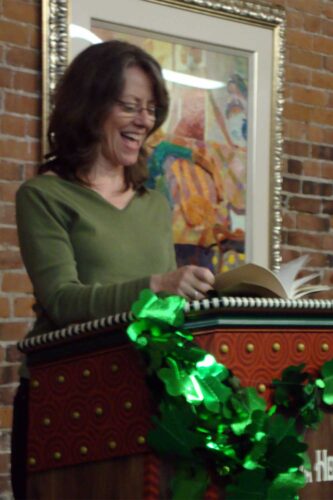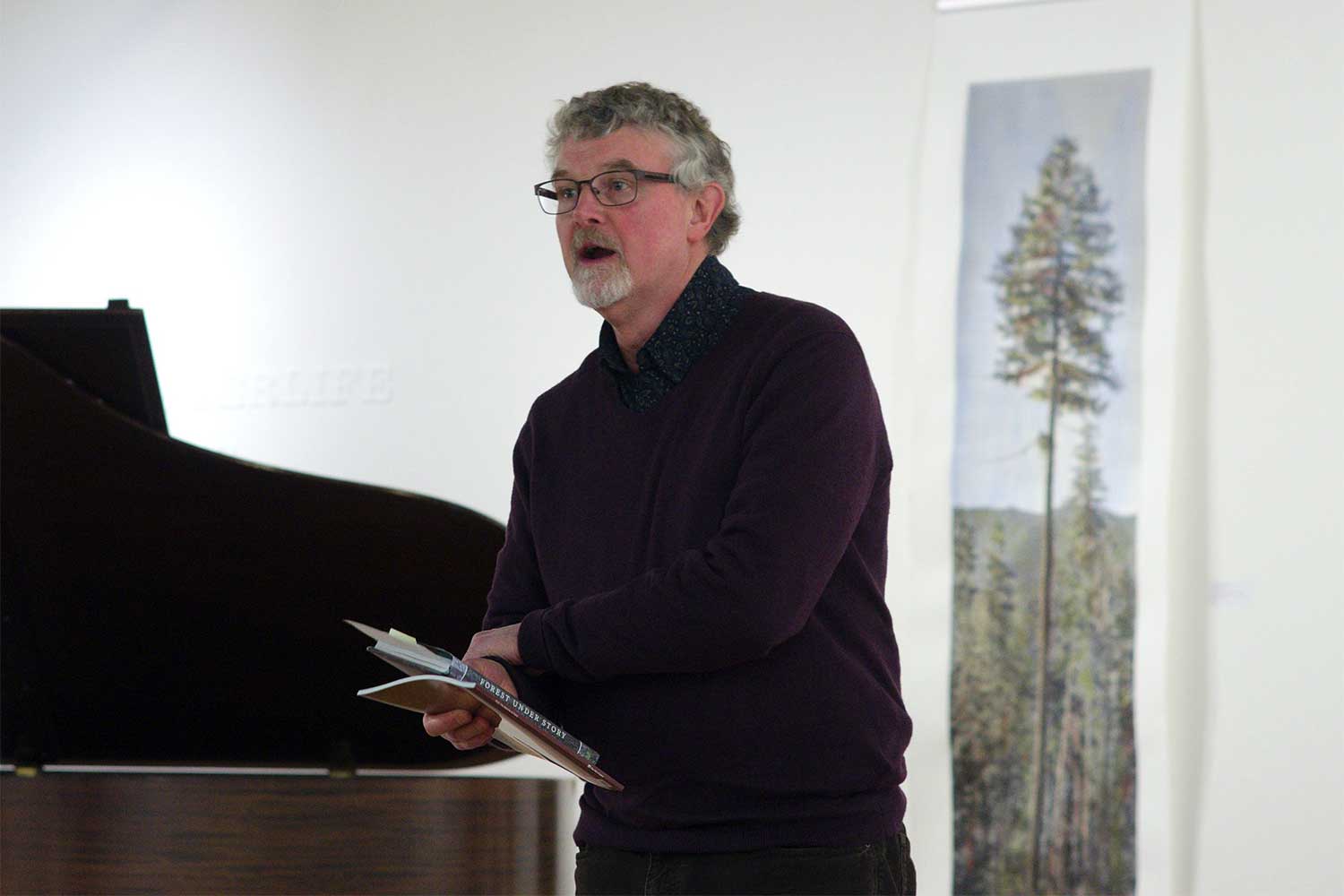
Oregon’s first poet laureate, Edwin Markham, who served from 1923 to 1931, was internationally known for his 1899 poem “The Man With the Hoe,” an ode to the miseries of the common laborer. In it, Markham writes of the system that oppresses workers:
O masters, lords and rulers in all lands,
is this the handiwork you give to God,
This monstrous thing distorted and soul-quenched?
It was a cry that would be heard around the world, printed in some 10,000 periodicals and translated into 40 languages over the coming decades. And it stirred considerable anger in the U.S. capitalist establishment, with railroad baron Collis Huntington offering $5,000 for a poem that could counter its radical sensibilities. The money was never paid out.
Oregon is now looking for nominations for a new poet laureate, radical or not. The two-year appointment pays $15,000 a year, as well as travel expenses of up to $10,000 a year, and requires the chosen poet to make at least 10 public appearances around the state as an artistic leader who “fosters the art of poetry, encourages literacy and learning, addresses central issues relating to humanities and heritage, and reflects on public life in Oregon,” according to the Oregon Cultural Trust website.
Candidates must be poets with a significant body of published work, must be publicly recognized for their excellence, must reside in Oregon and must have lived here for at least 10 years (Nicholas Kristof need not apply). The governor’s office makes the final selection with input from a review committee.
Nominations are being accepted through Monday, Jan. 8. Click here for more details and to submit your nomination.
The most famous former poet laureate Oregon has had was the late William Stafford, but the others who have held the post have been an interesting bunch.
After Markham, the state took a couple decades off from having a poet laureate. In 1951 a Portland newspaperman by the wonderful name of Ben Hur Lampman was named to the post. A popular columnist for The Oregonian, as well as a poet, Lampman served as poet laureate until his death in 1954.
Continuing Portland’s domination of the job, Ethel Romig Fuller, the state’s first woman poet laureate, was named to the post in 1957 and served until 1965. On learning in the early 1930s that The Oregonian planned to stop publishing poetry, Fuller convinced the paper instead to start a weekly poetry section, which she edited for 20 years. Perhaps her best known poem was her 1927 “Proof,” which argued that the existence of God is no stranger than the existence of radio. In 1939 The New York Times called it “the most quoted poem in contemporary English literature.”
Perhaps the most enduring poet laureate Oregon has had is Stafford, who held the post from 1975 to 1989. A professor at Lewis and Clark College — in, of course, Portland — he had previously served a year as the poetry consultant to the Library of Congress, a position now titled U.S. poet laureate.
Unlike his predecessors in the job, Stafford’s work is still widely read and enjoyed. One of his best known poems is “Traveling Through the Dark,” which lent its title to an anthology that won the National Book Award for Poetry in 1962. Keeping it all in the family, Stafford’s son Kim Stafford was Oregon poet laureate from 2018 to 2020.
Between the two Staffords were Lawson Fusao Inada (2006-2010), a third-generation Japanese American who taught for years at Southern Oregon University; Paulann Petersen (2010-2014), a student of Inada’s at SOU who taught high school in Klamath Falls and Portland and traveled 27,000 miles around the state and visited all 36 counties as poet laureate; Peter Sears (2014-2016), who taught at Reed College in Portland and was dean of students at Bard College in New York; and Elizabeth Woody, the state’s first Native American poet laureate (2016-2018).
Portland’s Anis Mojgani, whose spoken-word poetry shares an energy with standup comedy, was appointed to the post in 2020 and wraps up his second term this year.
We asked a number of poets and other writers in the Eugene area and elsewhere in the state who they thought should get the job, and what they would do if they got the job. Here’s what they said:
Eugene poet Cecelia Hagen
Who should be Oregon’s next poet laureate? I would recommend Amy Miller, of Ashland. She’s warm and funny and engaging, has been writing for decades and has many awards and publications. She manages publications for the Oregon Shakespeare Festival and participates in various fun poetry projects, such as August Postcard Poetry Month, with participants from all over the country and even a few from other countries. Rattle, a literary journal, has a “poets respond” feature every few days, posting poems related to current events. Amy has been the chosen poet half a dozen or so times, showing her ability to write “in the moment” without lapsing into preaching or platitudes.
What would you do if you were poet laureate? I’d focus on getting more poetry into public places, both in the form of posted poetry (such as those we’ve had in the parking garage on Oak Street) and in permanent installations (like the poems on the electrical cabinets at each EmX stop on the West 11th line, which I was fortunate enough to be able to write). C.D. Wright talked about helping poetry reach its full “field of ears,” and I’d work on that through these public spheres that would create encounters with poetry.
I would also work on increasing participation in poetry writing by doing something like what King County, Washington, did with its “Poetry on Buses” program. People are invited to write poems around a theme, and then some of the poems are posted on buses, other transit vehicles, and a centralized website.
Bend poet Ellen Waterston
Who should be Oregon’s next poet laureate? It’s time for a female poet laureate as well as a poet laureate from the east side of the Cascades. Elizabeth Woody was selected in 2016, but prior to that the position had never been held by an eastern Oregonian and, appropriately, Elizabeth was lauded primarily as a Native American poet rather than as a resident of the dry side of the state. A woman has not held the position since Elizabeth.
Some suggestions: David Axelrod, a recognized eastern Oregon poet and a skilled teacher. Irene Cooper, a central Oregon poet and teacher and Oregon Literary Arts finalist in poetry, 2023. Amelia Diaz Ettinger, a noted eastern Oregon poet of Puerto Rican descent. John Sibley Williams. He has impressive accomplishments as a poet and teacher.
What would you do if you became poet laureate? As a high desert author and poet, teacher and advocate for the literary arts, I would try to match the standards of inclusivity and inspiration set by Paulann Petersen during her term (2010-2014), starting with visiting communities in all 36 Oregon counties.
In my case, each visit would have four primary goals: To inspire current and emerging generations of regional poets by exposing them to the many forms and manifestations of poetry. To bring poetry to locations and/or populations that might otherwise have little opportunity to be exposed. To increase appreciation of the art and power of poetry as a means to navigate key cultural and social issues. And to showcase established and emerging regional poets in region-specific events and anthologies.
Eugene poet John Witte
Who should be Oregon’s next poet laureate? W.H. Auden declared that “poetry makes nothing happen.” The poet laureate must try to disprove this assertion. Poetry — like all the arts — awakens compassion and summons us to live more intensely and expansively. Have we ever needed these qualities more?
A poet eminently qualified to make this case is Charles Goodrich.

Corvallis poet, novelist and nonfiction writer Charles Goodrich
Who should be Oregon’s next poet laureate? I’ve been immersed in writing fiction for the past few years and, although I continue to write poems, I haven’t kept up on the scene. My opinion would not be worth the bytes it was written in.
Eugene poet Barbara Mossberg
Who should be Oregon’s next poet laureate? I am thinking about the idea of a combo in this position. My friends John Witte, former editor of the Northwest Review and famed local and national author, and his wife, Deb Casey, a great poet in her own right: a husband-wife team!
I got to think about the opportunities of a poet laureate a lot when Kim Stafford had this position — you’re talking to an oldie here. I knew his dad — we first read together when they inaugurated the Hult Center and I got to be on stage reading with him, which is one of the greatest honors of my life — so I was thrilled to get to know Kim, and I loved his work. I loved how the city of Portland had his poem on banners going into the zoo — what a great city! — honoring its poets and this way of words adorning our experience in civic nature.
What would you do if you became poet laureate? Ah! Ah! Gulp. I would embrace this role as an activist everywhere and all at once on behalf of the transformational role of poetry in civic life! My project of 10 years is a book, humbly conceived as The Power of Nobody to Change the World: the unlikely role of poetry in civil and human rights, war and peace, and the environment. I have tried to walk the talk.
Eugene novelist and short story writer Miriam Gershow
Who should be Oregon’s next poet laureate? Cecelia Hagen.
Cecelia is (1) A great working poet with a long history of writing and publishing. (2) Gifted at performing her poetry and making a crowd of poetry experts and poetry newbies alike feel included. Her poetry is accessible without being pat or formulaic. She is, importantly, warm and she makes people laugh, seemingly without trying. Lots of great poets are not great public speakers. (3) Not a Portlander! Nothing against Portlanders. I used to be one. But so much of the literary orbit in Oregon seems to range no further than Multnomah County. Let’s have a laureate who represents all the rest of us! (4) Experienced with making her poetry public and community-based in ways you’d want a laureate to.
What would you do if you became poet laureate? Um, learn to write poetry, I guess?